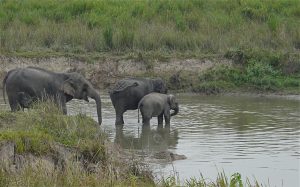Assam’s capital Guwahati — which is India’s gateway to the sensitive frontier northeast — could be “invaded” by wild elephants following rapidly shrinking forest cover and consequent loss of habitat over the past couple of decades.
The warning came in a report submitted by a government-appointed committee that was tasked to assess the status of the Amchang Wildlife Sanctuary on the eastern fringe of the city.
The 11-page report sounds alarm bells on the deteriorating conditions in the sanctuary due to increasing deforestation, earth-cutting and encroachment. The conclusions were based on field visits by the three-member committee headed by Chief Conservator of Forest Hem Kanta Talukdar.
“The present situation is absolutely volcanic inside as well outside Amchang Wildlife Sanctuary. It is a fact that there are fresh encroachment in the Amchang Wildlife Sanctuary and also the encroachers who were claiming the area as revenue land also are extending encroachments [sic],” said the report. It identified Chandrapur, Satgaon, Panjabari, Khanapara and Narengi Military Station areas in the city as being most vulnerable to depredation by elephants.
Among all these zones, the worst affected in the city is the stretch between Panjabari and Narengi Military Station and its contiguous areas, as mentioned in the report, where elephants straying into residential areas and roads is a regular occurrence.
A resident at the military station pointed out that elephants often enter the complex at night to drink water at a pond. “They leave without causing any harm. There have been occasions when elephants have also consumed food from the kitchens in the military station,” he said.
The damaging phenomena at Amchang Wildlife Sanctuary are discernible elsewhere at various places in Assam and the northeast which governments have been unable to check. Environmental activists and non-governmental organizations had approached the courts with public interest litigation to compel the government for stringent measures.
A section of government officials and environmental activists are of the firm opinion that land encroachment in wildlife sanctuaries and the hills around Guwahati could not have taken place without the active connivance of the revenue department of Assam government.
At Amchang, more than 400 families were evicted by the government four years ago, an action which was halted following an order from the court. Again, last year, notices were served to many families for allegedly constructing houses in the sanctuary.
Two committees had also been constituted by the government under the chairmanship of the minister of environment and forests. One was for examining issues of rehabilitation and other relief measures for the people evicted from the sanctuary and providing policy recommendations. The other committee, headed by the deputy commissioner of the district, was tasked to conduct a joint survey for demarcation of forest land and revenue land in the Amchang Wildlife Sanctuary.
All these steps notwithstanding, the depredation at Amchang continues which was underscored in the recent report. It has a long list of recommendations for the government to implement, beginning with a plea for “immediate eviction” of the encroachments at the fringe areas of the sanctuary where teak plantations have been destroyed, and snapping all the electricity connections to the households build on encroached land.
The report makes a case for imposing a total ban on earth cutting in and around the sanctuary and extraction of water resources by the households through bore and ring wells. The plantation areas are to be surveyed and restored with adequate surveillance facilities through a combined team of the police and forest guards, the report recommended.
The government has been urged to prepare a “zonal master plan” for the eco-sensitive zone of the sanctuary along with an inquiry by a high-level official team to unearth the factors that facilitated the encroachment.
Rajeev Bhattacharyya is a senior journalist in Assam, India

































